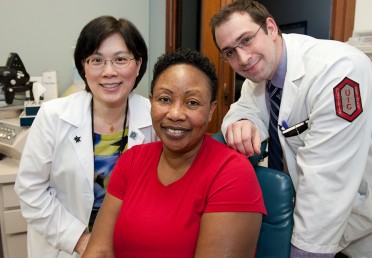First in Chicago to offer new eye treatment
When Cecilia Apiedu got the call from her ophthalmologist at the University of Illinois Hospital & Health Sciences System offering her the chance to be the first patient in Chicago to try a new treatment for an eye condition that was threatening her vision, she was “dancing up and down.”
“I realized I was really having trouble with my vision two years ago when I went back to school and needed to do a lot of reading,” recalled Apiedu who is now a certified nursing assistant.
Then about a year ago her vision began to decline dramatically. She saw halos, and after-images that persisted when she closed her eyes. Then double-vision.
“I was always experimenting to find a way to manage,” she said. She watched television with the TV perched on her lap.
Apiedu had vitreomacular adhesion, or VMA, a disease in which the vitreous, the clear jelly-like substance filling the center of the eye, shrinks with age and pulls the retina inward. Vision becomes distorted, and if the retina tears, serious vision loss and even blindness can result.
UI Health is the first center in Chicago to offer a new, nonsurgical treatment for the disease, which affects half a million people in the U.S.

Dr. Jennifer Lim, left, with patient Cecilia Apiedu and Dr. Senad Osmanovic. Photo: Roberta Dupuis-Devlin/UIC Photo Services
“Ms. Apiedu is in many ways a typical VMA patient,” says her UI Health ophthalmologist, Dr. Jennifer Lim, noting that VMA is most common in women over 50. Lim holds the Marion H. Schenk, Esq. Chair in Ophthalmology for Research of the Aging Eye in the UIC College of Medicine.
In Apiedu’s case, Lim could see a hole developing, an indication that she would need surgery.
The surgery — which Lim has done successfully many times — is difficult for the patient. The ophthalmologist removes the vitreous from the center of the eye, peeling it away from the retina, and then inserts a bubble into the eye to help the macular hole heal.
The patient must then remain lying in a face-down position for two weeks.
Instead, on Feb. 13, Apiedu sat comfortably in an exam room in the UI Health retina clinic and received an injection in her left eye of ocriplasmin, a drug just approved by the FDA in November and marketed in the U.S. as Jetrea. The procedure took less than 10 minutes, and an hour later, photos of her eye showed that the impending macular hole was resolving.
Jetrea is an enzyme that chemically attacks a natural glue that fastens the vitreous to the retina. In minutes it dissolves the substances that compose the glue. It represents a major advance in treatment for patients facing loss of vision from VMA because it can allow them to avoid surgery, says Dr. Rohit Varma, professor and chair of ophthalmology and visual sciences at UI Health.
Varma, an expert on quality-of-life assessment in eye disorders and treatment, testified at Jetrea’s approval hearing before the FDA. One of the first questions the FDA considers in approving a new drug, he said, is how does the drug improve the patient’s experience?
“Lying face-down for days at time following the surgery is not a pleasant experience for the patient,” he said.
Apiedu was relieved that she didn’t have to have surgery or spend weeks in a difficult recovery. Except for a brief feeling of pressure, she said, the injection was completely painless.
For the first few minutes after the injection, she saw a “kaleidoscope” view of the world. But just 24 hours after injection, her vision was significantly improved. Lim said that imaging studies of the eye showed the vitreous was no longer pulling on the macula.
Apiedu was enthusiastic.
“I want for other people to benefit from this,” she said.
The University of Illinois Hospital & Health Sciences System provides comprehensive care, education and research to the people of Illinois and beyond. The UI Health System includes a 495-bed tertiary hospital; the University of Illinois at Chicago colleges of Medicine, Dentistry, Pharmacy, Nursing, and Applied Health Sciences, the UIC School of Public Health and UIC’s Jane Addams College of Social Work; 22 outpatient clinics located in Chicago; 12 federally qualified health centers throughout the city; and College of Medicine and affiliated health care facilities in Urbana, Peoria and Rockford.
For more information: The University of Illinois Hospital & Health Sciences System
